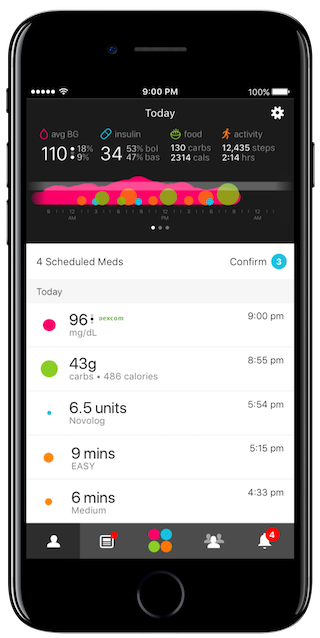 Continuous glucose monitoring company Dexcom, which already allows users to monitor their CGM data on their phones and Apple Watch, is now making some patient data available to third parties via an API.
Continuous glucose monitoring company Dexcom, which already allows users to monitor their CGM data on their phones and Apple Watch, is now making some patient data available to third parties via an API.
"If you look back at the past when our hardware was all proprietary, we’ve evolved from that to an app company where our CGM now works as an app on the phone," Dexcom CEO Kevin Sayer told MobiHealthNews. "As we look at the app world, we have to come to the conclusion that we can’t do all of these things by ourselves. By going to the APIs, what we’ve done is we’ve made a universal platform whereby if somebody wants access to this data, here’s the terms by which you get it and here’s how you go get it."
Specifically, the API makes retrospective data, which the FDA defines as data three or more hours old, available to Dexcom partners. Those seeking to integrate realtime data will have to form deeper partnerships with the company.
"We’re not going to do this while compromising our core business," Sayer explained. "The live display of CGM to a patient is what we do and that’s a class 3 medical device. When someone has a relationship with us in that area, such as our insulin pump partners, that’s a class 3 medical device and that’s a little bit different."
The announcement, made earlier this week, includes a laundry list of partners that are already using the API, and Sayer says even more are in the works. The list includes diabetes management company One Drop, diabetes-focused diet management company Nutrino, diabetes data management platform Tidepool, diabetes management and population health company Rimidi, health incentive app Achievement, diabetes alert system Ensa, and App Practice, which connects physicians to patients' diabetes data. Apps will only have access to data if the CGM user grants that access.
"If you look at One Drop, with fingersticks and coaching and the things that they offer, they do different things than we do," Sayer said. "Incorporating CGMs to those patients' routines might be very helpful to them. If you look at Nutrino, another one of our partners, that’s a nutrition app. Well we’re not going to take the time to go count calories or carbs for every food and put it into our app. We can’t do that, that’s not a core strength for us. So giving our patients the opportunity to integrate their CGM data into those apps might provide a better experience to our patients."
Another area where the API could come in handy is on the clinician side, where it could allow data to be uploaded automatically into the electronic medical record. That's the area that App Practice is working in.
"AppPractice’s new platform allows clinicians to view their patient’s glucose on the same day via their smartphones, as part of their mHealth patient care practice,” App Practice founder Dr. Rakesh Patel said in a statement. “By using the data from the Dexcom API, our clinicians can now make timely changes and adjust insulin for their patients more effectively. Access to patient data like this enables clinicians to dramatically improve patient care and can lower healthcare costs.”
Before the API launched, it was possible to pull Dexcom data from Apple HealthKit. But going directly through Dexcom will be easier and more streamlined, particularly for apps available on both iOS and Android operating systems.
Sayer says the API launch fits into a history of firsts for Dexcom, and as such is something the company will learn from and adjust.
"We were the first to produce a sensor accurate enough to change somebody’s life and to deliver the performance that people were looking for. Then we were the first ones to connect it to the phone, first to enable patients to share data, and then to have the transmitter signal go straight to a phone and bring high technology and daily healthcare together. We’re the first to develop a device that’s labeled to dose insulin because of the robustness of our technology and our platform," he said. "And now we're the first in our industry to try something like this. I think others will follow, and we’ll see how this one goes."














